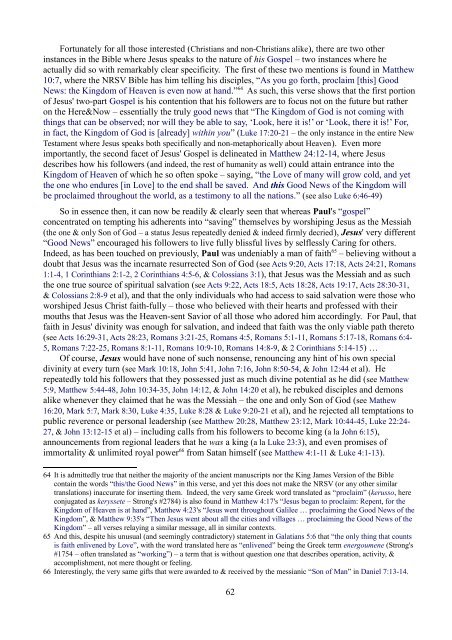The Cult of Paul
an exhaustive biblical examination of the starkly contrasting lives, values, & theologies of Jesus Christ and Paul -- Jesus' most zealous “apostle,” and the true father of the modern-day Christian church
an exhaustive biblical examination of the starkly contrasting lives, values, & theologies of Jesus Christ and Paul -- Jesus' most zealous “apostle,” and the true father of the modern-day Christian church
You also want an ePaper? Increase the reach of your titles
YUMPU automatically turns print PDFs into web optimized ePapers that Google loves.
Fortunately for all those interested (Christians and non-Christians alike), there are two other<br />
instances in the Bible where Jesus speaks to the nature <strong>of</strong> his Gospel – two instances where he<br />
actually did so with remarkably clear specificity. <strong>The</strong> first <strong>of</strong> these two mentions is found in Matthew<br />
10:7, where the NRSV Bible has him telling his disciples, “As you go forth, proclaim [this] Good<br />
News: the Kingdom <strong>of</strong> Heaven is even now at hand.” 64 As such, this verse shows that the first portion<br />
<strong>of</strong> Jesus' two-part Gospel is his contention that his followers are to focus not on the future but rather<br />
on the Here&Now – essentially the truly good news that “<strong>The</strong> Kingdom <strong>of</strong> God is not coming with<br />
things that can be observed; nor will they be able to say, ‘Look, here it is!’ or ‘Look, there it is!’ For,<br />
in fact, the Kingdom <strong>of</strong> God is [already] within you” (Luke 17:20-21 – the only instance in the entire New<br />
Testament where Jesus speaks both specifically and non-metaphorically about Heaven). Even more<br />
importantly, the second facet <strong>of</strong> Jesus' Gospel is delineated in Matthew 24:12-14, where Jesus<br />
describes how his followers (and indeed, the rest <strong>of</strong> humanity as well) could attain entrance into the<br />
Kingdom <strong>of</strong> Heaven <strong>of</strong> which he so <strong>of</strong>ten spoke – saying, “the Love <strong>of</strong> many will grow cold, and yet<br />
the one who endures [in Love] to the end shall be saved. And this Good News <strong>of</strong> the Kingdom will<br />
be proclaimed throughout the world, as a testimony to all the nations.” (see also Luke 6:46-49)<br />
So in essence then, it can now be readily & clearly seen that whereas <strong>Paul</strong>'s “gospel”<br />
concentrated on tempting his adherents into “saving” themselves by worshiping Jesus as the Messiah<br />
(the one & only Son <strong>of</strong> God – a status Jesus repeatedly denied & indeed firmly decried), Jesus' very different<br />
“Good News” encouraged his followers to live fully blissful lives by selflessly Caring for others.<br />
Indeed, as has been touched on previously, <strong>Paul</strong> was undeniably a man <strong>of</strong> faith 65 – believing without a<br />
doubt that Jesus was the incarnate resurrected Son <strong>of</strong> God (see Acts 9:20, Acts 17:18, Acts 24:21, Romans<br />
1:1-4, 1 Corinthians 2:1-2, 2 Corinthians 4:5-6, & Colossians 3:1), that Jesus was the Messiah and as such<br />
the one true source <strong>of</strong> spiritual salvation (see Acts 9:22, Acts 18:5, Acts 18:28, Acts 19:17, Acts 28:30-31,<br />
& Colossians 2:8-9 et al), and that the only individuals who had access to said salvation were those who<br />
worshiped Jesus Christ faith-fully – those who believed with their hearts and pr<strong>of</strong>essed with their<br />
mouths that Jesus was the Heaven-sent Savior <strong>of</strong> all those who adored him accordingly. For <strong>Paul</strong>, that<br />
faith in Jesus' divinity was enough for salvation, and indeed that faith was the only viable path thereto<br />
(see Acts 16:29-31, Acts 28:23, Romans 3:21-25, Romans 4:5, Romans 5:1-11, Romans 5:17-18, Romans 6:4-<br />
5, Romans 7:22-25, Romans 8:1-11, Romans 10:9-10, Romans 14:8-9, & 2 Corinthians 5:14-15) …<br />
Of course, Jesus would have none <strong>of</strong> such nonsense, renouncing any hint <strong>of</strong> his own special<br />
divinity at every turn (see Mark 10:18, John 5:41, John 7:16, John 8:50-54, & John 12:44 et al). He<br />
repeatedly told his followers that they possessed just as much divine potential as he did (see Matthew<br />
5:9, Matthew 5:44-48, John 10:34-35, John 14:12, & John 14:20 et al), he rebuked disciples and demons<br />
alike whenever they claimed that he was the Messiah – the one and only Son <strong>of</strong> God (see Mathew<br />
16:20, Mark 5:7, Mark 8:30, Luke 4:35, Luke 8:28 & Luke 9:20-21 et al), and he rejected all temptations to<br />
public reverence or personal leadership (see Matthew 20:28, Matthew 23:12, Mark 10:44-45, Luke 22:24-<br />
27, & John 13:12-15 et al) – including calls from his followers to become king (a la John 6:15),<br />
announcements from regional leaders that he was a king (a la Luke 23:3), and even promises <strong>of</strong><br />
immortality & unlimited royal power 66 from Satan himself (see Matthew 4:1-11 & Luke 4:1-13).<br />
64 It is admittedly true that neither the majority <strong>of</strong> the ancient manuscripts nor the King James Version <strong>of</strong> the Bible<br />
contain the words “this/the Good News” in this verse, and yet this does not make the NRSV (or any other similar<br />
translations) inaccurate for inserting them. Indeed, the very same Greek word translated as “proclaim” (kerusso, here<br />
conjugated as keryssete – Strong's #2784) is also found in Matthew 4:17's “Jesus began to proclaim: Repent, for the<br />
Kingdom <strong>of</strong> Heaven is at hand”, Matthew 4:23's “Jesus went throughout Galilee … proclaiming the Good News <strong>of</strong> the<br />
Kingdom”, & Matthew 9:35's “<strong>The</strong>n Jesus went about all the cities and villages … proclaiming the Good News <strong>of</strong> the<br />
Kingdom” – all verses relaying a similar message, all in similar contexts.<br />
65 And this, despite his unusual (and seemingly contradictory) statement in Galatians 5:6 that “the only thing that counts<br />
is faith enlivened by Love”, with the word translated here as “enlivened” being the Greek term energoumene (Strong's<br />
#1754 – <strong>of</strong>ten translated as “working”) – a term that is without question one that describes operation, activity, &<br />
accomplishment, not mere thought or feeling.<br />
66 Interestingly, the very same gifts that were awarded to & received by the messianic “Son <strong>of</strong> Man” in Daniel 7:13-14.<br />
62

















